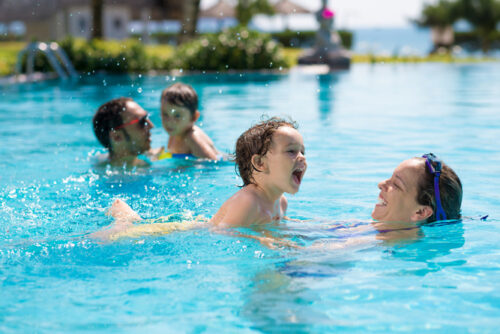Summer safety tips for children

by Drs. Kelsey Izzo and Sarah Smith,
Pediatricians, Oak Orchard Health
In upstate New York, we wait for months for beautiful summer weather. It’s finally here, but with the sunshine comes new tips for families to stay safe as they enjoy it this time around.

Sun safety
According to the Centers for Disease Control (CDC), just a few serious sunburns can increase your child’s risk of skin cancer later in life. Adults and children need protection from ultraviolet (UV) rays whenever they’re outdoors. How can you avoid this?
•Hats and sunglasses with UV protection protect everyone from the sun.
•Kids need to wear sunscreen. Wearing 30-50 SPF sunscreen is important for kids, and reapply every two hours. If they are wet or swimming, you should put it on again after they dry off. Children under six months should not be exposed to direct sunlight at all. They should always be protected from the sun.
•On very hot days, be sure children are hydrated by offering them water as often as possible. The exception is with babies under six months. They do not need any additional water; breast milk or formula is enough for infants.
•UV rays are the strongest and most harmful during midday.
•Summer is a great time to take your children out for a stroll but be mindful of how hot it’s getting inside the stroller, especially if you’re using a sunshade or blanket to shield the sun. Children can overheat. How can you tell? If they are turning red or are sweaty, those are two signs. Also, feel their chest to see if it’s hot. Shorter walks are preferred.
•Babies do not need to wear too much clothing on hot days. The rule of thumb is one more layer than you.

During the hot summer, it’s never a good idea to leave kids in cars for any amount of time. And be sure to check the backseat so that no child is left behind.
Water Safety
Naturally, no child should be left alone in or near water. Drowning is a very real risk. According to the CDC, drowning is the number one cause of death in children ages one to four. Stay within arm’s reach of the child even if they’re wearing a flotation device.
Be sure to have a fence around your backyard pool with locked gates. Home doors should be locked so kids can’t get out to the pool area. Sensors on gates and doors offer added protection and safety. Remember, even small kiddie pools with six inches of water are still a hazard. Kids still need to be supervised.
Bike riding
•Bike helmets for kids of all ages are recommended. Of course, adults should also wear helmets.
•Limit distractions. No bike rider should be listening to music. They should be aware of their surroundings and hear the vehicles and other bikes that may be in the area.
•Adults can supervise the little ones. Young children shouldn’t be riding alone and certainly not riding on busy streets if there’s no shoulder or sidewalk.
•Knee pads and elbow pads are a great safety idea.
•Kids should let parents and caregivers know where they are going and when they’re expected back. Parents can check in with their kids periodically to be sure they are in a safe location.
Cell phones
Whether it’s summer or winter, less than two hours of screen time per day (ages two and up) is a best practice. The American Academy of Pediatrics discourages media use by children younger than two and recommends limiting older children’s screen time to no more than one or two hours a day.
Avoiding screen time before bedtime is another great tip. That includes a TV, laptop, tablet, or cell phone.
Staying healthy in the summer
We’re here if you need us. If you’re looking for a pediatrician for your children, give Oak Orchard Health a call at 585-637-3905.
Provided photos



